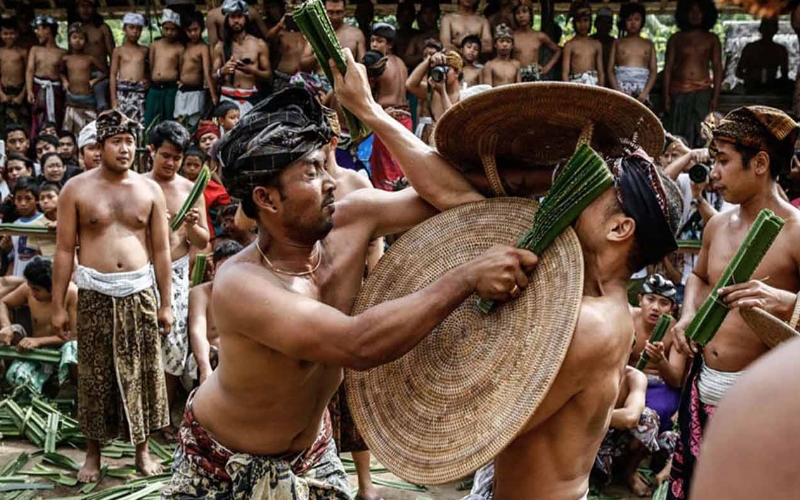Two hours away from Legian to the eastern part of Bali, you’ll find yourself in Karangasem regency, an area less traveled by mainstream tourists. If you drive a little further upon Desa Tenganan. Desa translates as village in Indonesia.
Tucked between the mountains, lies Desa Tenganan. A village untouched by evolving modernity happening across the globe, what you’ll find here are likely to be traditional Balinese houses and ways of life that seemed frozen and undisturbed since ancient times. This combat ritual of Mageret Pandan, is specific to Tenganan village only.
The Tenganan residents are believed to be the native Balinese. They are also known as Bali Aga, or indigenous Balinese. The majority of Hinduism belief and culture commonly found in Bali today, originates from the Kingdom of Majapahit in Java. It is one of the reasons why there are differences between the culture and belief system in Tenganan to the rest of Bali. For example, Nyepi or silence day is unknown to the Bali Aga people.
Mageret Pandan is a series of Sasih Sembah ritual. Sasih Sembah ritual is the biggest ceremony held only once a year. Mageret Pandan is helped for 2 days, starting at 2 pm in the yard of the Tenganan Village. The event is to be followed by men adults, because it is so dangerous if it was played by childrens. During the war, there will be a gamelan selonding. Selonding is a musical instrument in the Tenganan that only can be played by a saint. The instrument is not carelessly played, but is only played on certain event. The instrument is also prohibited from touching the ground.
Before the event starts, every participants walk around the village to ask for safety to God. They wear traditional clothes called pakaian adat madya, consisting of sarong, shawl, headband and shirtless. The participants would see it as friendly duels woth no hate on eah other, supposed to show their maturity by fighting between each other. Like the name, Pandan War, the weapons used in this event are thorny pandanus tied and armed with a small rattan shield in the other hand. It might appear to be intense, but it has become a coming-of-age ritual for young boys in the village aswell.
All participants take turns fighting about 3 hours. After the procession, the wound on the back of the participant is treated with traditional medicines. When the war is finished, every patricipant will have no revenge in the hearts of each participants, because the tradition is meant as an offering ceremony that must be done sincerely. They all sit together to have a feast on banana leaves (megibung) and laugh together at the end.
The tradition of Mageret Pandan is said to have organinated from Hindu mythology about King Maya Denawa and Indra. King Maya Denawa calimed himself as a god greater than the entire Hindu pantheon. He forbade people from performing their religous ceremonies, which angered the gods. Indra himself fought and defeated Maya Denawa for this blasphemy, and their battle was commemorated through Mageret Pandan ritual.

